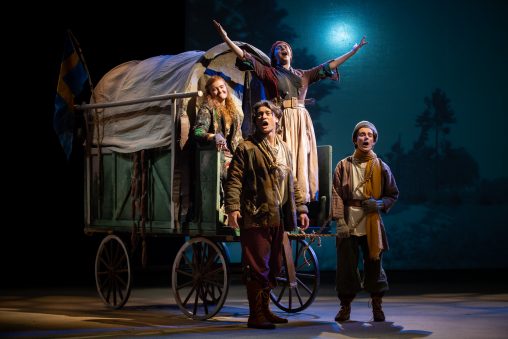
Wright State’s production of “Mother Courage” is the center of a year-long study of “The Cost of War” to be concluded with a roundtable discussion on April 24 and a mini-concert May 1.
“Human history becomes more and more a race between education and catastrophe,” said English writer H.G. Wells in the wake of World War I.
Wells’ quote will kick off a roundtable discussion at Wright State University on Wednesday, April 24, about what can be learned from theatre and the humanities about the cost of war. To be held in the Millett Hall Atrium from 4 to 5:30 p.m., it is free and open to the campus community and public; refreshments will be served.
The roundtable will feature Wright State faculty and is the culmination of a series of related readings and lectures that also includes Wright State Theatre’s production of “Mother Courage and Her Children.” The year-long project is sponsored by Wright State CELIA (Collaborative Education, Leadership and Innovation in the Arts), the Dayton Literary Peace Initiative and the Dayton Peace Museum.
The events and the roundtable are the brainchild of W. Stuart McDowell, professor and artistic director of the Department of Theatre, Dance and Motion Pictures.
“It’s time to talk about war and peace because peace often leads to war and there often seems to be a sense of inevitability about war that is not at all the case,” said McDowell. “Most wars are unnecessary.”
McDowell expects the discussion to touch on the machinery of war, the impact of war, what creates war, what nurtures war, what keeps wars going and the cost of war to everyone.
“It’s a broad sense of the word ‘cost.’ It’s not just the financial cost, but the psychological wounds that happen after the war,” he said. “Much of the cost of war is unseen and unheard. It’s almost like the silent scream of war.”
Besides McDowell, those expected to be at the roundtable include Elfe Dona, associate professor of German and teacher education; Nenad Jovanovic, an assistant professor of media studies in the Department of Theatre, Dance and Motion Pictures; Christopher Oldstone-Moore, senior lecturer and assistant to the chair for graduate studies in the Department of History; John Lavarnway of Theatre; and Jean-Michel Lamoine of Modern Languages.
“I want people who are interested in talking about this,” said McDowell. “One of the great accomplishments I think we can attain here at Wright State is to teach people to think outside the box, to not take things at face value; examine it so it even has more value once you get through the process. It may not change your mind, but it will make you a stronger person by having had a dialogue.”
“Mother Courage and Her Children,” performed at Wright State in February, is a play by Bertolt Brecht. It is considered the German playwright’s most passionate and profound statement against war. “Mother Courage” is one of nine plays that Brecht wrote in resistance to the rise of Fascism and Nazism. In response to the invasion of Poland by the German armies of Adolf Hitler in 1939, Brecht wrote “Mother Courage” in what writers call a “white heat,” in less than a month.
McDowell intends to use the play as a springboard and context for an open discussion. “Mother Courage” is set during the Thirty Years’ War of 1618–1648, which involved all of the European states and became one of the bloodiest conflicts up till then. It follows the fortunes of Anna Fierling, nicknamed “Mother Courage,” a wily canteen woman with the Swedish Army who is determined to make her living from the war. Over the course of the play, she loses all three of her children to the very war from which she tried to profit.
McDowell said he hopes issues raised by the play set the tone for the roundtable discussion. The discussion will begin with the showing of video clips from a rehearsal of the production.
“We don’t want people to come to conclusions. We want people to learn how to ask questions,” he said. “The takeaway will be to create a more inquisitive mind.”
McDowell served as chair of the Department of Theatre, Dance and Motion Pictures from 1994 to 2016 after working in professional theatre in New York and California for two decades as an artistic director, actor, composer and translator. He is the Frederick A. White Distinguished Professor of Professional Service for 2018.
The Cost of War will conclude with a free concert-poetry jam on May 1 at 6:30 in the Recital Hall of the Music Building.

 Wright State names Rajneesh Suri dean of Raj Soin College of Business
Wright State names Rajneesh Suri dean of Raj Soin College of Business  ‘Only in New York,’ born at Wright State
‘Only in New York,’ born at Wright State  Wright State president, Horizon League leaders welcome new commissioner
Wright State president, Horizon League leaders welcome new commissioner  Wright State celebrates homecoming with week-long block party
Wright State celebrates homecoming with week-long block party  Wright State baseball to take on Dayton Flyers at Day Air Ballpark April 15
Wright State baseball to take on Dayton Flyers at Day Air Ballpark April 15 